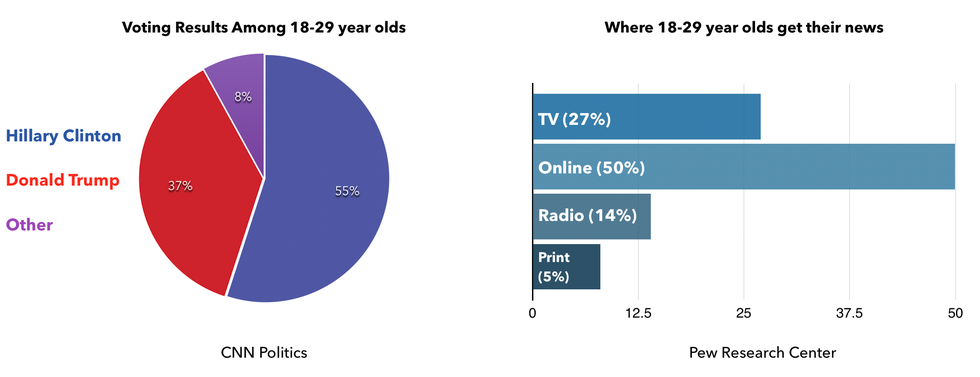According to an analysis by BuzzFeed, fake news outperformed real news during this past election cycle. They came to this conclusion by analyzing performance of various politically charged keywords in terms of the amount of engagement, i.e., the number of likes and shares on a post. Buzzed also found that a large portion of the fake news shared seemed to slant heavily toward Donald Trump, with headlines like “Pope Francis Shocks World, Endorses Donald Trump for President, Releases Statement” and “Just Read the Law: Hillary is Disqualified From Holding Any Federal Office.”
The actual impact of these sorts of stories on the election is still unclear and it’s hard to say if we’ll ever know for sure the degree to which they tilted the election. Based on polling from Pew Research Center, a significant number of Americans still get their news from good old fashioned TV. However, the voting blocks that had the strongest support for Hillary Clinton appeared to also be the ones most inclined toward social media and internet-based news (see figures below).
Whether or not fake news had an impact on the election, part of having a successful democracy is having an informed populous. If the trend toward sourcing our news from the internet continues to grow as the younger generation ages we would also expect to see an increased dependence on social media as a means of staying informed. Something should be done to curb this spread of fake news, but respect toward the principals of net neutrality should be considered. In a free and open internet we shouldn’t find that the articles we share are mysteriously vanishing but if the content of an article posing as real news is fake we should be forewarned.
Let’s be honest, most people are not inclined to fact check every single article they see especially if the content is shared by someone they trust in other aspects of life and/or share their same political views. Facebook appears primed to hire various fact checking organizations to support in efforts to fact check articles that are flagged by users as fake. The exact details of Facebook’s system remain to be seen, but there is a very easy way to ensure the free flow of information while at the same time warning users beforehand.
Facebook should first come up with a blacklist of known fake news websites and white list of reputable news sources regardless of ideological leanings. Blacklisted sites will automatically receive a small warning on the post indicating that the article might be fake. Any content that isn’t automatically flagged by the blacklist can be reported by users, investigated by Facebook’s team of fact checkers, and then the same warning can be added to articles from that website. Having actual people monitor this process will ensure that articles that simply differ from a user’s ideology aren’t allowed to be marked as fake simply for partisan reasons.
This approach appears to be the best way to deal with this issue while still respecting the user’s ability to share whatever they wish without being censored. Being informed about what we’re consuming does not take away from the freedom of the person publishing the content. One way to think about it is when a radio show has a segment about a certain company who also happens to be a sponsor of the radio station. The host will offer a statement of full disclosure where they inform their listeners that the subject of the segment happens to support the station. This arms the listener with a reasonable grain of salt with which to continue listening. As we see more and more fake news in our feeds, it is time for social media sites to do more. Whether or not Mark Zuckerberg wants to admit it Facebook and other sites are becoming news outlets and they should be making efforts to ensure the quality of the content we’re provided with.






















